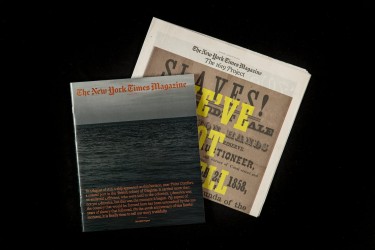The split between these two camps is hinted at in Adam Serwer’s fine recap of the 1619 Project controversy for The Atlantic, “The Fight over the 1619 Project Is Not About the Facts,” published in late December as the debate was still heating up. Serwer writes:
The clash between the Times authors and their historian critics represents a fundamental disagreement over the trajectory of American society. Was America founded as a slavocracy, and are current racial inequities the natural outgrowth of that? Or was America conceived in liberty, a nation haltingly redeeming itself through its founding principles?
What Serwer misses is that this is not simply a clash between the Times authors and a group of historians: it is also a pre-existing argument between historians themselves. (Wilentz, in his subsequent reply to Serwer in The Atlantic this week, tries to perform a magician’s act and render invisible the very existence of that debate, much as he ignores the scholarship when he is not mischaracterizing its substance.) The arguments made by the 1619 Project are largely based on the work of scholars such as Horne, Holton, Taylor, myself, and others (indeed, Hannah-Jones and Silverstein have acknowledged as much). By bringing the critical ideas of these scholars to a wide audience, the 1619 Project essentially drew back the curtain on a vital debate within the field of U.S. history. By responding with such force, critics of the project have helped define the contours of this debate. It is an important one for us to have, in part because this is an argument that goes all the way back to the founding itself.
In the years leading up to the Revolution, the politics of slavery proved polarizing, and the most deeply committed patriots, including John Adams and Jefferson, sought to control it and usually to tamp it down. Their private papers amply demonstrate their knowledge that the enslavement of Africans was tyranny of the most extreme sort. But they mostly kept such thoughts to themselves and their antislavery friends abroad, saving their loudest protests for what they described as their own enslavement—by the British. This questionable rhetorical tactic met with mixed results. By 1767 American protesters who claimed that unfair taxes amounted to a form of enslavement were being called out for their hypocrisy, even by their friends. “Oh! ye sons of Liberty, pause a moment, give me your ear,” asked Boston merchant Nathan Appleton. “Is your conduct consistent? can you review our late struggles for liberty, and think of the slave-trade at the same time, and not blush?” He also mocked racial justifications for slavery: “Methinks were you an African, I could see you blush.” Ending slavery was the only way to “shew all the world, that we are true sons of Liberty.”
When Gordon Wood complains that no American founders said they were declaring independence in order to keep their slaves, he neglects the fact that most revolutionaries who tried to explain American protest were embarrassed about slavery—in the face of charges of hypocrisy.












